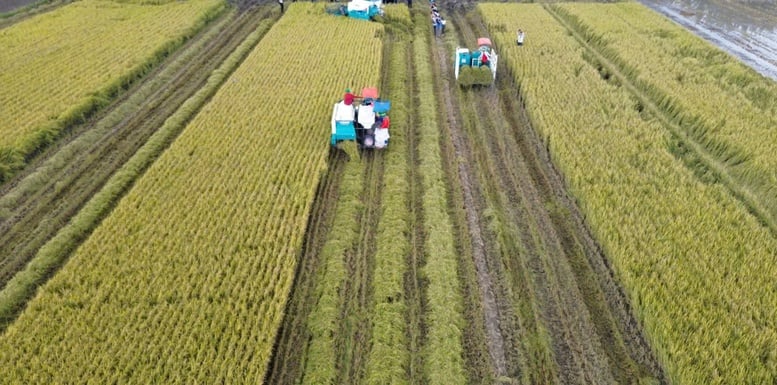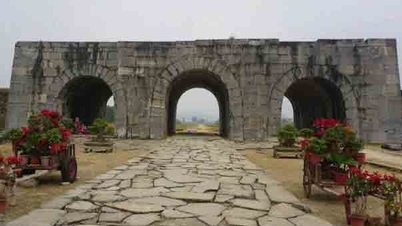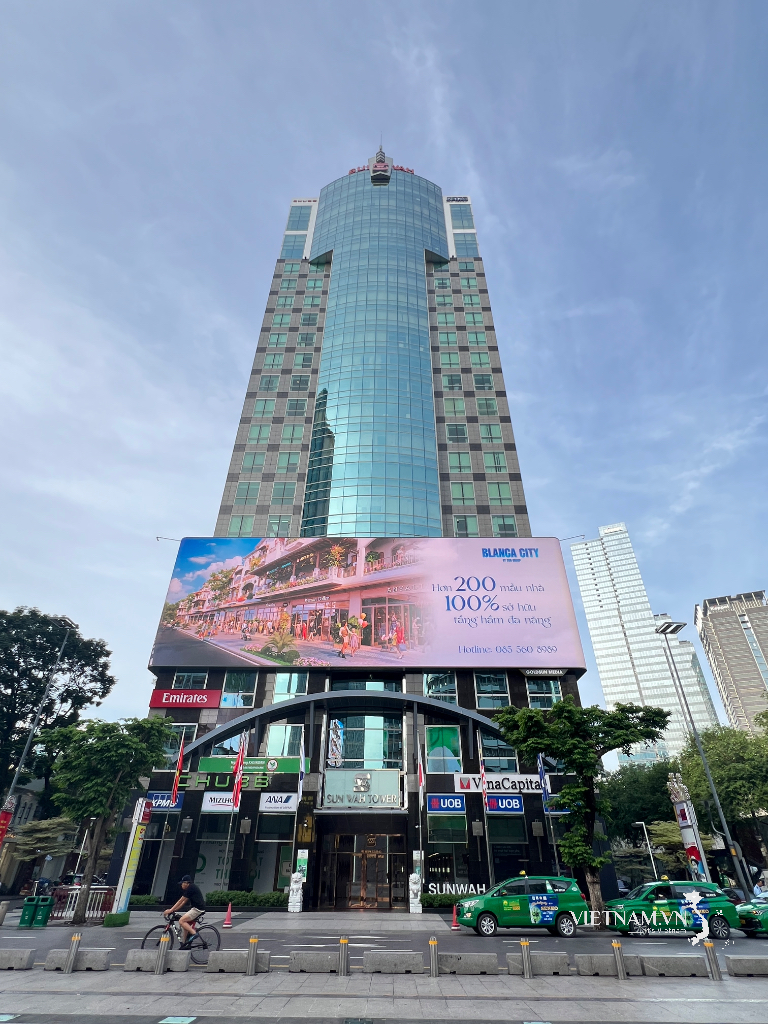
The model of 1 million hectares of high-quality, low-emission rice cultivation by Tien Thuan Cooperative ( Can Tho City) - Photo: VGP/LS
Mechanization of agriculture, circular economy model
Within the framework of the Project "Sustainable Development of 1 Million Hectares of High-Quality, Low-Emission Rice Cultivation Linked to Green Growth in the Mekong Delta by 2030" (1 Million Hectare Rice Project), the International Rice Research Institute (IRRI) plays a key technical partner role, coordinating with the Ministry of Agriculture and Environment and local authorities to develop and implement the Project.
Accordingly, IRRI has developed a technical process for cultivating high-quality, low-emission rice, which is being applied in the 1 million hectare rice project for the entire Mekong Delta region; and supported the Ministry of Agriculture and Environment in developing tools and piloting the implementation of a monitoring, reporting, and verification (MRV) system to track and measure the effectiveness of emission reduction.
Since 2024, IRRI has coordinated the implementation of 7 pilot models in the provinces of Kien Giang, Can Tho, Tra Vinh , Soc Trang, and Dong Thap (50 hectares each), with several key support measures, such as: training on cultivation techniques for 1 million hectares, improving efficiency and reducing emissions, such as applying alternating wetting and drying (AWD) irrigation combined with real-time water level measurement technology based on sensors, row sowing technology combined with burying fertilizer, proper fertilization, integrated pest management, harvesting, and straw management in accordance with circular agriculture principles.
Speaking with the Government Online Newspaper, Ms. Nguyen Thi Thu Huong, Deputy Director of the Department of Crop Production and Plant Protection (Ministry of Agriculture and Environment), said that the 1 million hectare rice project has so far recorded positive progress both technically and with the support and participation of many partners - from farmers, private enterprises, policy-making agencies to international organizations.
According to Ms. Thu Huong, IRRI is supporting the Ministry of Agriculture and Environment in developing technical procedures for the Project, while also developing and applying high-quality, low-emission rice cultivation technologies, such as using improved rice varieties, mechanized sowing combined with fertilization, optimal water management, balanced nutrient management, and specialized regional nutrient management... In addition, IRRI is also supporting cooperatives in building circular economy models using post-harvest straw, contributing to increasing farmers' income and protecting the environment.
"With the coordinated support from IRRI, along with the involvement of ministries, departments, local authorities, businesses, and the people, we are confident that the Project will be implemented effectively, contributing to the transformation of rice production towards increasing farmers' income, ensuring quality, green and sustainable practices, and affirming the position of Vietnamese rice in the international market," Ms. Huong said.

Dr. Robert Caudwell, Head of IRRI Representative Office in Vietnam - Photo: VGP/LS
Responding to the Government Online Newspaper, Dr. Robert Caudwell, Head of IRRI's Representative Office in Vietnam, assessed: The 1 million hectare rice project is an important initiative not only for Vietnamese agriculture but also for global food security. Within the framework of this project, with a team of experienced international scientists, IRRI has been supporting the Ministry of Agriculture and Environment in developing technical procedures for 1 million hectares along with high-quality, low-emission rice technologies such as improved varieties, mechanized sowing combined with fertilization, optimal water management, balanced nutrient management, and specialized regional management...
Results from current pilot models show benefits including: a 30-50% reduction in seed sowing; a 30-40% reduction in nitrogen (N) fertilizer per hectare; a 3-4 times reduction in pesticide use; a 30-40% saving in irrigation water; a more than 5% increase in yield; an increase in profit of over 5 million VND per hectare; an average reduction of 6 tons of CO₂ emissions per hectare; and almost all rice produced from the model is purchased at a price 200-300 VND/kg higher than the market price.
Reduce costs, adapt to climate change.
The results of applying the production processes show that, in Tra Vinh, the total cost of rice production in the area applying the model was 14% lower than the cost outside the model, but the profit in the model was 20% higher than outside the model. In Soc Trang and Dong Thap, the estimated total cost of rice production in the area applying the model was 20% lower than the cost outside the model, and the profit in the model was 12% higher than outside the model...
Regarding mechanization and straw management, support has been intensified for comprehensive solutions such as field mechanization with the application of precision seeders combined with fertilizer application, reducing the amount of seeds and fertilizers used, increasing productivity and reducing production costs.
At the same time, post-harvest straw processing has seen the popularization of models towards circular agriculture, increasing income, reducing emissions, and being environmentally friendly, such as producing organic fertilizer from straw using mechanized methods integrated with biotechnology, cultivating straw mushrooms, etc.
These solutions not only reduce emissions but also create added value, helping farmers generate additional income from agricultural by-products.
For sustainable development, the 1 million hectare rice project focuses not only on increasing rice yield and quality but also on adapting to climate change – a major challenge for rice production in the Mekong Delta – and developing risk maps and adaptation plans for crop production. This tool has been effectively implemented in five regions of Vietnam, including the Mekong Delta.
In addition, actively breeding and selecting rice varieties that are resistant to adverse conditions such as drought, salinity, and flooding contributes to strengthening the adaptability of Vietnam's rice industry.
Ms. Pham Thi Minh Hieu, Head of the Crop Production and Plant Protection Sub-Department of Can Tho City, stated: The results of implementing a sustainable rice production model on 50 hectares, applying advanced techniques such as machine-based row sowing combined with fertilizer embedding, alternating wet and dry water management (AWD), balanced fertilization according to crop needs, and the "1 must, 5 reductions" rice cultivation process (must use certified rice seeds; reduce seeds, reduce water, reduce fertilizer, reduce pesticides, reduce post-harvest losses)... resulted in a yield increase of nearly 0.7 tons/ha, a cost reduction of approximately 1 million VND/ha, and most importantly, a reduction in greenhouse gas emissions of 2 to 12 tons CO₂/ha. Businesses purchased rice at prices higher than the market rate, demonstrating the potential for forming a sustainable value chain.
Currently, the Can Tho Department of Agriculture and Environment has collaborated with IRRI to assess the level of technology adoption by farmers in order to provide timely support and rewards, contributing to promoting green farming. In the future, Can Tho will continue to expand the model, broaden training, and strengthen market connections, thereby increasing people's income while contributing to fulfilling Vietnam's commitment to reducing emissions in agriculture.

Businesses were awarded certificates of the right to use the "Green, Low-Emission Vietnamese Rice" trademark for businesses that met the standards, in April 2025 - Photo: VGP/LS
'Green Vietnamese rice, low emissions'
One of the highlights of the Project is building a green Vietnamese rice brand. Accordingly, IRRI and the Ministry of Agriculture and Environment have identified pillars of long-term cooperation including developing high-quality, low-emission rice production models; strengthening the rice value chain with in-depth analysis and digital tools; supporting evidence-based policies and quantitative emission reduction calculation systems (MRV); establishing regional technical centers to support cooperatives and farmers; and training to enhance the capacity of agricultural extension officers.
Accordingly, IRRI has also supported VIETRISA in developing a brand for low-emission green Vietnamese rice and granting certification for its use to businesses participating in the 1 million hectare rice project.
Referring to the effectiveness of applying technology in implementing the Project, Assoc. Prof. Dr. Bui Ba Bong, Chairman of the Vietnam Rice Industry Association (VIETRISA), said: Currently, in implementing the 1 million hectare rice project, IRRI has closely coordinated with the Ministry of Agriculture and Environment, VIETRISA, and partners in developing technical processes for producing high-quality, low-emission rice, and processes for managing straw to reduce emissions according to the circular principle, and successfully implemented pilot models in many localities. Many techniques have been effectively applied, such as mechanization of sowing, alternating wet and dry irrigation techniques, straw management, and quantitative emission reduction (MRV) calculations...
As someone directly involved in the implementation of the project, Mr. Nguyen Hong Thien, Director of Tu Sang One-Member Limited Company, said: During the implementation of the 1 million hectare rice project, the company has collaborated with IRRI to provide mechanization solutions suitable to the actual farming conditions.
These devices not only help reduce seed usage and save on fertilizer, but also contribute to shortening cultivation time, increasing productivity, and improving economic efficiency for farmers. This mechanization process significantly reduces greenhouse gas emissions – a core objective of the project aimed at green and sustainable agriculture.
"We are committed to continuing to accompany, innovate, and make positive contributions to the modernization of the rice industry, helping to enhance the value chain of production, improve people's lives, and elevate the position of Vietnamese rice in the international market," Mr. Thien said.
Mr. Cao Tien Khai, Chairman of Tien Thuan Cooperative (Can Tho City), shared: "When the 1 million hectare rice project was implemented, we realized even more the benefits of applying technology in production and practicing circular agriculture today."
Applying this model has reduced fertilizer use by 20-30%, cut input costs by 10-15%, while increasing profits by 1.3-6.2 million VND/ha. At the same time, it contributes to environmental protection, reducing CO₂ emissions by 2-6 tons/ha.
Le Son
Source: https://baochinhphu.vn/khoa-hoc-cong-nghe-mo-duong-cho-de-an-1-trieu-ha-lua-xanh-102250515145647338.htm





































































![[Photo] Closing Ceremony of the 15th Conference of the Central Committee of the 13th Party Congress](https://vphoto.vietnam.vn/thumb/402x226/vietnam/resource/IMAGE/2025/12/23/1766462841764_a1-bnd-3731-1647-jpg.webp)































Comment (0)